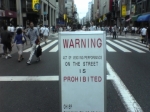14 September 2005
The worst moment of our nation!
Japan's ruling party of last half century won the election. It was a surprising victory. They now occupied more than 60% of the total seats.
It was really stupid choice by voters. They haven't done great things. They've increased the tax and sent troops to Iraq. They worsened the relationship between China and Japan. Why the voters chose them? The opposition party and the people were just foolish.
Anyway, I don't want to talk about it. This country is getting worse and worse, the people's mind and standard of living is lowering.
Say good bye to Japan. There is no democracy here.
01:05 Posted in Japan News, Politics | Permalink | Comments (2) | Tags: Japan, election
31 August 2005
The Aviator (2004)
I rent the DVD of this movie. I did not like this movie.
Yes, it was gorgeous but there was no story in it. Especially the ending was not so good. It was like documentary film.
The worst of all is DiCaprio did not fit into that Howard Hughes character.
22:34 Posted in Film | Permalink | Comments (0) | Tags: Movies
24 July 2005
Pedestrians' Paradise Day
Today is Sunday.
Some of the main streets in Tokyo are open to pedestrians.
It is fun to walk on the road where normally only cars are passing by.
It is also fun to see a performer on the street like below. He was singing a folksong. Not very good though.

But sorry, what he is doing is illegal. See the below picture.

15:50 Posted in Tokyo Life | Permalink | Comments (0) | Tags: music
18 June 2005
Watergate and American media today
A man who has been known as "Deep Throat" exposed himself to the public.
Deep Throat was Mr. Mark Felt who was No.2 ranking officer of FBI at the time Nixon was accused of Watergate scandal.
Some say this exposion changed the watergate from journalism justice to inner politics quarrel because now we found Deep Throat was No.2 of FBI. FBI at that time was threatened by Nixon because of the organizational reform plan the president was trying to implement. FBI wanted to prevent that, then they used the Washington Post to turn the president down.
However, Watergate proved how American journalism was healthy at that time. Japanese media is in fact pets for the government. Our constitution insures freedom of speech but the media is so attached to politicians in order to protect their exclusive press club.
But American media today is becoming like Japanese. Media became conglomarit for big corporation. One example is NBC is owned by GE which has been providing products to US army, so they are not against war in Iraq. Media put the business ahead of seeking the truth.
Conglomarit is not the only aspect that changed American journalism. Public opinion became so conservative. Since 911, patriotism became the most important thing for Americans. People do not want to hear anything that sounds unfavourable to their government. Fox news is the symbol of this phenomenon.
Even the US government admits Iraq has no link with 911 attack and doesn't have WMD, FOX news watchers don't know such facts.
Our nation went through the same path in the past. In 1930's when Great Depression agonized the country's economy, the imperial army started invasion of China. Although the invasion started with fake incident that Chinese army bombed Japan owned railway and Japanese media knew it, they did not report it to the public but they rather supported the army's action which led to Rape of Nanking in 1937 and Pearl Harbor attack.
What should we learn from that?
21:45 Posted in Media, Politics | Permalink | Comments (0) | Tags: political issues





